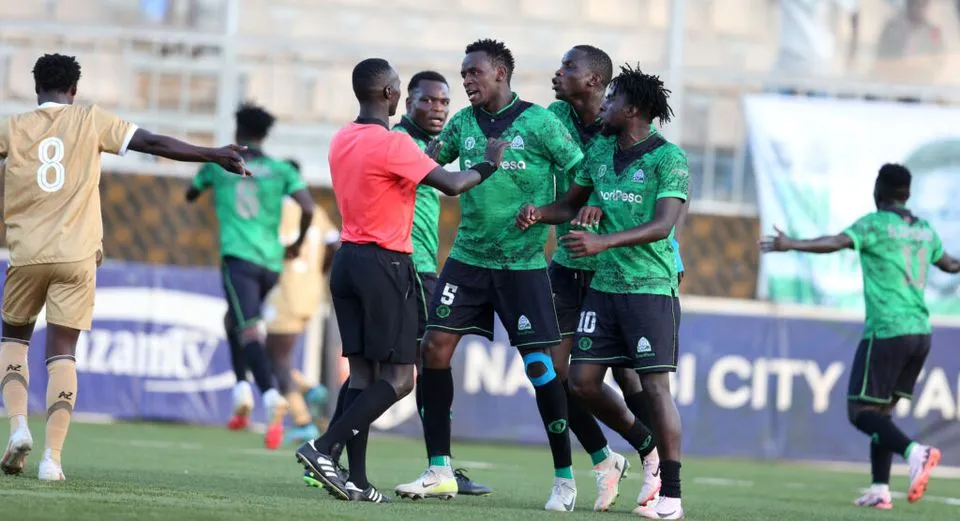In the unpredictable world of football, few stories stir the soul—and the headlines—quite like Gor Mahia post-season management changes. Once more, the mighty K’Ogalo are at a crossroads after a harrowing trophyless campaign that has left fans, players, and management reckoning with hard realities beneath the surface glitter of a storied legacy.
From sky-high expectations to a nightmare campaign
The 2024/25 season began with the air of inevitability for Gor Mahia. Having clinched the league in the previous year, hope surged through the terraces, fueled by memories of past glories. The Green Army , as their faithful are known, believed another chapter of dominance was afoot. Yet, as the campaign unfolded, reality diverged sharply from expectation. Draws and defeats to lower-table teams chipped away at their confidence. The once-ironclad away form dissolved, and consistency slipped through the club’s fingers. The league title, ultimately seized by Kenya Police after an impressive turnaround, was just the first blow.
Cracks in the foundations
Coaching changes and staff infighting haunted Gor Mahia as much as their lack of a consistent goalscorer on the field. Leonardo Neiva, the Brazilian coach, was let go in late 2024, prompting the club to turn again to the familiar figure of Zedekiah ‘Zico’ Otieno on an interim basis. But even this move could not provide much-needed stability. In February, Croatian coach Sinisa Mihic arrived, shifting Zico back to an assistant role. The revolving door in the technical area reflected growing instability behind closed doors.
With each change, rumors swirled—whispered accusations of sabotage among staff, and festering divisions in the playing unit. Mihic himself would publicly allege betrayal within the technical bench, pointing fingers and fracturing trust. By May, after just three months, Mihic was gone, and Zico was once more handed a poisoned chalice.
| CASINO | BONUS | INFO | RATING | |
|---|---|---|---|---|
|
bonus
100% bonus up to KSH 10,000
See 3 Bonuses
|
info
60+ software providers, over 5,000 casino games, BK 0000751 PG 0000451 |
|||
|
bonus
Bonus on 1st deposit: Free Bet up to 10,000 KES
See 3 Bonuses
|
info
BCLB 0000794 Licensed betting platform with a variety of bonuses and high odds |
|||
|
bonus
Sign up for KES 46 bonus after first deposit!
See 11 Bonuses
|
info
20+ crash & instant games, Aviator bonuses BK 0000704 |
|||
|
bonus
New players get 50 free spins and a Ksh 2500 freebet!
See 7 Bonuses
|
info
BK 0000665 PG 0000405 Good combination of online casino and betting platform |
|||
|
bonus
Win Ksh 30,000 daily in Aviator tournament!
See 8 Bonuses
|
info
20+ software providers, Aviator+ other crash games, BK 0000671 PG 0000428 |
Fan unrest and the last straw
The emotional weight of Gor Mahia’s failures became palpable after their defeat in the FKF Mozzart Bet Cup final to Nairobi United—a newly promoted side yet to feature in the top flight. Arching over the pitch at Ulinzi Sports Complex, the story was not just one of a 2-1 loss, but of something deeper breaking within the club’s psyche. A missed penalty, tempers flaring on and off the pitch, and the shattering of the invincible aura that Gor Mahia has longed carried.
The scenes were striking. Zedekiah Otieno, once a symbol of club loyalty, was forced to seek refuge from outraged supporters, shielded by police after the final whistle. Fan dissatisfaction spilled from social media to stadium corridors, encapsulating a crisis that merged tactical questions with raw passion—and with it, a demand for change.
Leadership swept aside in the aftermath
Facing the mounting discontent, the board acted with rare swiftness. On July 2, a club statement confirmed what many had called for: the entire technical bench, along with team security staff, was dismissed following an internal review. The club, keen to manage optics, described the separation as mutual and conducted in good faith, offering gratitude for the dedication shown by the outgoing staff.
Outgoing figures included Zico, goalkeeping coach Boniface Oluoch, team manager Victor Nyaoro, assistant Michael Nam, and all stewards—an unequivocal sweep reflective of the scale of change perceived as necessary to restore order. Even CEO Raymond Oruo, after five years at the club, parted ways by mutual consent the same day.
Key lessons and the road ahead
Peering past the obvious disappointment, it is critical to understand the undercurrents that led to Gor Mahia’s mass management changes:
- this is how it’s done – a reliance on reputation that arguably bred inertia rather than innovation,
- this is how it’s done squared – backroom staff discord that undermined trust and unity,
- this is how it’s done cubed – a failure to refresh playing personnel and offer clear tactical direction during moments of pressure.
While the heartache of losing out on silverware—especially in such dramatic fashion—will sting for months, such an episode also provides a rare catalyst. Gor Mahia’s leadership has now signaled its intention to address issues at their root, restructuring not just the technical bench but the broader operational foundation as well. This is a moment where the wounds can, with the right care, become the seeds of long-term recovery.
Human stories behind the statistics
What elevates this saga from mere footballing disappointment to a story of human emotion is the raw vulnerability seen both on the touchline and in the stands. For Zedekiah Otieno, the journey ended not with a lap of honor but with police protection, highlighting how the volatility of success and failure in football is etched into personal narratives—not just team sheets and league tables.
The players, countless staffers, and the wider Green Army now share in collective reflection. How a club responds in these moments—seeking renewal with transparency, humility, and ambition—often defines its future legacy as much as any trophy.
A new era beckons for Gor Mahia
The dust is still settling, and supporters will stay tuned to chairman Ambrose Rachier’s promised announcements about new appointments. What is clear now is that Gor Mahia’s post-season shake-up is not about scapegoating, but about an overdue recognition that football dynasties require periodic reinvention. For the first time in nearly a decade, Gor Mahia finished a season empty-handed. The silence of lost silverware has spoken volumes, prompting necessary change.
If ever there was a season for introspection, this was it. A nightmare campaign may, paradoxically, open the door for reform—setting the stage for Gor Mahia to reclaim their place at the summit of Kenyan football, in spirit as much as in statistic. As a sport journalist who has watched the highs and lows of K’Ogalo unfold, I am reminded that it is the courage to begin again that most truly defines the greatness in this beloved game.











